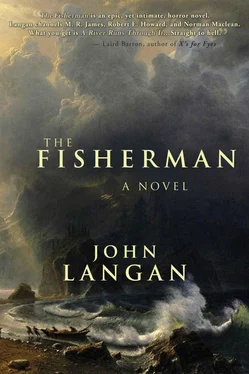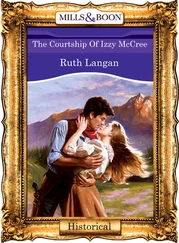Rainer nods at the stream. “Here, though…Wilhelm tells me that I killed him. As surely as if I had poured poison into his coffee, I murdered him. Worse, he says, I did not have the courage to see my crime all the way through. Instead, I indulged my conscience, and threw away everything the two of us had worked so hard for. Now, he is dust, dust which remembers what it was to be a man and can do nothing with that knowledge. He curses me. He damns me as a coward and a fraud.”
His tongue fighting him, Jacob asks his father-in-law where, exactly, they are.
Standing, Rainer says, “You are thinking, maybe, that this place is familiar?” He steps over the wall and walks ten feet to a young tree. He places his left hand against its trunk, his head bowed, and stands like that for a moment. Then he raises his head, reaches into the front pocket of his trousers, and withdraws a knife. It’s a silver dinner knife, like the one Rainer employed against Helen, all those years ago; Jacob has an intuition that this is that same knife. In a series of quick strokes, Rainer slashes the tree. He must have sharpened the blade, Jacob thinks, because it opens deep grooves in the bark. When he’s done, Rainer takes a step back to survey his work. Jacob looks past him to the tree, but he can make no sense of the marks struck in it — though they produce the strangest sensation of calm. His concentration loosens. It’s difficult to recall what he and Rainer are doing here. He turns in the direction he came and is most of the way to the stream before he remembers his father-in-law. Cheeks flushed, he runs back to the wall and hurdles it. Careful to avert his eyes from the tree, he approaches Rainer, whose position is unchanged. He is gazing past the tree into the woods, as if he can discern something within them. Jacob risks a glance in that direction, but cannot make out anything other than row after row of trees. He hears Rainer murmuring a word that he does not recognize; it sounds like “Thalassa, thalassa.” As Jacob draws up to him, Rainer turns, a grimace on his face, and sets off towards the car.
The walk back is less eventful. While they’re beside the stream, Angelo’s voice resumes its accusations, but its volume is diminished, to the point Jacob could believe he’s imagining it within the roar of the water, the way you might see a face within the grain of a piece of wood. Neither he nor Rainer speaks again until they’ve scaled the ridges that conceal the creek and are crossing the field to the car. There, Jacob asks Rainer if the problem has been solved.
“As much as it can be,” Rainer says. “The mark on the tree will turn aside most who come near it. It is the best we can do, without a human sacrifice.”
Jacob tells himself that his father-in-law is joking — although Rainer is not smiling.
At some point in the nineteen-twenties, a year or two after Jacob and Rainer’s visit to it, the locals start referring to the new stream as Deutschman ’s Creek, which rapidly becomes Dutchman’s Creek. Who originates the name, and why, is lost to history, but by the early thirties, the name and the stream have made their way onto maps of the area. Once she’s heard the full story of the Fisherman from Jacob, Lottie will complain about the name. Ever the stickler for detail, she says that the Fisherman’s Creek would be more accurate. Jacob doesn’t argue with her, but he suggests that they take the name as a kind of memorial to her father. That’s ridiculous, Lottie says, whoever named the stream could not have known anything about her father. Jacob can see, however, that the notion secretly pleases his wife. It helps her to recall her father as he was before the affliction that took him from her. Rather than the frail man who once was lost for almost a week, when he wandered away from his job into a work camp down in Orange County, she can picture him stepping into their undersized house after a day’s labor with his fellow stonemasons, a handkerchief knotted around his neck, his shirt and trousers powdered with a fine dust. Jacob can almost share her vision, except that, in his imagining of it, Rainer’s face is washed by white light.
There are moments, as the years slide by and their children grow, as Jacob’s boss makes him a partner in the monument business, as the country plunges into the Great Depression, as another war with Germany looms, that neither Jacob nor Lottie can fully credit the events they were part of at the camp. All of it seems like a book they read, a movie they watched. After Jacob’s death, from lung cancer, in late nineteen fifty-one, that sensation of unreality will assail Lottie more often. She’ll have vivid dreams in which she’s back in the house in Heidelberg, with the heavy oak table that has been in her mother’s family for four generations, and the cabinet full of Dresden china, and the long lace curtains that her Aunt Gretchen made for her parents as a wedding present. When she wakes in her bed with the lumpy mattress and the fraying blankets, and looks at the plain dresser, its top crowded with pictures of her family, and the open closet, still hung with Jacob’s clothes — though she keeps saying she’ll sort through them and give what’s in decent condition to charity — Lottie will be swept by the certainty that this is the dream. This life in which she left her home for a country whose language has never felt right on her tongue, where she once stood face to face with a woman who had been dead, where she married and bore children to a shy man from Austria who expressed himself more elegantly through the work of his hands than through his speech: it’s all the invention, the yield of an adolescent imagination desperate for experience. If only she could find her way back to the blank space that borders dreaming and remain there long enough to navigate its gray emptiness, then the next time she opens her eyes, it will be to Clara calling her to come downstairs to kiss her father before he’s off to the University.
She’s never able to stay in that empty place, to slip out of it into her old existence. Instead, she’ll rise from her bed and cross to the dresser. She’ll slide out the top drawer, and search beneath the undergarments layered within it until her fingers touch the edge of a small box. It’s the kind of reinforced cardboard box that a department store would use for a piece of jewelry. Lottie will lift it out and set it on top of the dresser. She’ll open the lid and part the tissue paper inside it, exposing the piece of metal concealed by its folds.
It’s a fishhook. It’s a couple of inches long, no different from what you might tie to the end of your line. The metal is tarnished, crusted with a dark substance that Lottie would tell you is her late husband’s blood. This is the hook that stuck into Jacob’s cheek, right below his eye, when his axe severed the Fisherman’s line and the power it contained burst outwards, spraying the hooks that had dangled from it in all directions. So stunned and exhausted from that adventure had Jacob been that he had walked to the bunkhouse and collapsed onto his bed with the hook lodged in his flesh. The next day, he awakened with his cheek swollen and painful. A bunkmate pulled the hook free, releasing a pocket of pus and blood and leaving Jacob with a small white scar. Jacob kept the hook folded in a handkerchief. Once Lottie learned of its existence, she asked for the hook, which Jacob presented to her in the jewelry box. She’ll pinch it between her thumb and index finger and hold it up to the light. She’ll do the same for the Reverend Mapple, near the end of her long life and at the end of the fantastic tale she’s told him. He’ll squint at the curved bit of metal in her fingers, its surface patterned with the blood of a man long dead, its barbed point still sharp.
Читать дальше












